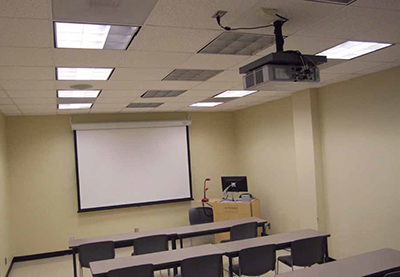Editor’s note—In an uncertain economy, more schools and universities are required (or even incentivized) to make their departmental budgets go further, with one caveat: do not compromise the overall quality of education for students. Is it possible to continue enhancing education with learning technology and cut spending at the same time? Green industry expert Gina Sansivero of RelampIt explains why.
K-12 schools and colleges now have the option of purchasing re-certified products, such as projector lamps and computer servers, to help stay on budget.. This Portland State University classroom features a Panasonic projector.Learning technology in classrooms has been proven to increase comprehension, test scores, and retention. This increase is so significant, in fact, that many public schools are often offered additional funding through grants for re-fitting classrooms with newer technology. Further, private schools are increasingly investing in technology for both on campus and distance learning students. This additional spending on educational technology allows the infusion of different teaching styles, learning styles, and educational media to be woven into a classroom experience that is more effective and offers a broader spectrum to students than the “traditional” classroom. Purchasing re-certified products is a smart way that schools save money and contribute to their sustainability initiatives, while offering enhanced educational opportunities to their students through up-to-date technology.
Doesn’t re-certified just mean refurbished?
Re-certified equipment is a step beyond refurbished; it means that there is a qualified level of quality or higher standard that the product has to attain in order for it to be approved for release into circulation. That standard, and the quality assurance measures used to guarantee the standard is met, should be documented at the facility which performs the re-certification. The process may be overseen or developed by the original manufacturer to ensure optimal performance of re-certified items, as in manufacturer certified repair depots. Sometimes re-certified equipment is even reconditioned at the manufacturer’s factory, complete with a manufacturer’s warranty.
What are the benefits?
Re-certifying equipment extends the usable life of the product and reduces e-waste. Complete lifecycle evaluations (point from manufacture to failure or obsolescence) and e-waste are two major concerns for manufacturer and end-user alike. Depending upon the local regulations, the responsibility to properly dispose of or recycle equipment can fall on the manufacturer or user (school), usually resulting in a recycling, shipping or reclamation fee that may or may not be passed on to the end-user (possibly eating up more school funds). Many public schools are mandated to initiate sustainability processes within their buildings which can include cutting energy consumption, recycling materials, reducing pollution and focusing on smart procurement practices, which allows schools to take into account the supplier or product manufacturer’s own sustainability programs and manufacturing processes. As part of responsible purchasing, re-certified equipment helps schools adhere to existing environmental policies.
What technology can and cannot be re-certified?
The most common re-certified product purchases by educational facilities are for computers (desktops, laptops, etc). The factory-new quality coupled with the fact that re-certified computers are typically covered by the same or similar limited warranty as a new computer, mean that schools have little reason to doubt the reliability. With a few upgrades, schools are usually able to afford a higher caliber machine than they would have otherwise been able to had re-certified machines been unavailable. Additionally, many of the leading computer manufacturers offer re-certified computers, including Dell and HP. Savings for purchasing re-certified computers can typically range from 20 percent-30 percent off the cost off a new machine. To many educational institutions, re-certified computers seem to make sense.
Re-certified projectors are also available to schools looking for economical technology equipment options. NEC leads the charge of manufacturers who factory re-certify their projectors and then offer them through a variety of distributors. Often, the best re-certified projectors to look for are newer models that are specifically engineered with schools in mind. i.e. they have the proper inputs, are networkable, have longer lamp life and have accessories available to ensure proper installation into the classroom and appropriate picture size on the screen. Experienced dealers can help determine the most suitable re-certified projector for the space.
Re-certified servers offer another real cost savings for schools. While servers are usually scalable and can be easily upgraded to increase capacity and processing, they do become obsolete or unreliable and must be replaced. Servers are not an inexpensive purchase but buying re-certified servers can help to alleviate some of the financial burden while ensuring that records are secure and private. Again, HP and Dell offer a number of re-certified server options with limited warranties.
What’s the next step?
The most important consideration when purchasing re-certified equipment is to thoroughly research the supplier and product to confirm that the equipment is, in fact, reliably re-certified and performing like new; the equipment should not be simply refurbished and resold. Taking the time to research budget friendly, reliable products allows schools to offer their students technology rich learning environments. In view of the studies supporting the benefits technology in the classroom, it’s hard to argue the need for such an investment. Together with the fulfillment of another “check box” on the sustainability audit list and the reduction in cost, re-certified equipment can help a school’s performance on a variety of levels.
Gina Sansivero is a partner with RelampIt (www.relampit.com) in Bohemia, New York, a company that reclaims, refits, and re-certifies original projector lamps that meet manufacturer’s specifications.

